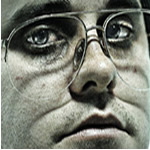Chapter 27 (J.P. Schaefer)
As the second “story of how John Lennon died” film to come out in the last six months (the other being “The Killing of John Lennon” in December of 2007), “Chapter 27″ speeds through the story much quicker, but I felt like someone had spiked my popcorn with Valium. And I’m still trying to understand why we need to keep seeing this tragic story instead of just embracing the time we had Lennon on this earth.
Most already know that Mark David Chapman was a nut job, but in “Chapter 27,” Jared Leto who plays Chapman and the script show the real life character in an even more psychotic role than in the other ’07 film.
We learn a few tidbits, like the urban tale surrounding the Dakota, from the location of it build site in 1883 that gave it its name (since it was surrounded by nothing but farmland at the time, people felt it was as if they were living in the Dakota Territory in the Midwest), to the belief that all who lived there had some leanings toward satanic cults.
This is most likely the remnants left from the Roman Polanski flick, “Rosemary’s Baby,” which was filmed there. But a six-degrees-of-separation epiphany comes to Chapman during the film: Polanski directed Rosemary’s Baby, and Polanski’s wife, Sharon Tate was killed by the Manson family, who told his followers that the Beatle’s White Album song “Helter Skelter” was a coded prophecy of an apocalyptic war. Insert the theme to Twilight Zone here. Or not.
Again, we could have found this out by a quick Google search and would have been on our way five minutes later.
I can’t say that this is Leto’s best role to date. But after taking on a whopping 70 lbs. for the role you get to see what he’ll look like when he’s 10 years older and overweight. I rarely quote other critics, but this one from Slate.com made me laugh, “Leto looks like he’s eaten his 30 Seconds to Mars bandmates.” Copying the internal dialogue formula in “The Killing of John Lennon,” the viewer gets to hear a few poignant thoughts along the way.
“Everyone needs something, to find something. Everyone is cracked; broken. You have to find something to fix you; to give you what you need. To take you away and make you whole.”
One interesting part in the film is when Chapman leaves the run down no-tell/motel for better accommodations, specifically the Sheraton where he would put his killing plan together. For just a moment, while he’s taken aback by a ranting and raving man on the street yelling at no one, that he’s the sane one in the scenario.
But it isn’t long before he’s ranting just as furiously, but at himself, having and internal and external argument on whether he will ultimately pull the trigger or go back home. Who’s to say if Chapman didn’t get another opportunity to see Lennon that night, what might have happened, or not happened. And at this point, that’s irrelevant. And so is this film.
It’s ironic that Leto’s lines at the beginning of the film include Chapman’s distain for movie stars, seeing them as nothing more than phonies, since one would expect Chapman to feel the same about the person playing his character. Leto is always acting, even when he’s on stage with his band. Yes, he always strives to separate the two and never wants to discuss his movie roles when he’s being interviewed about his music. But it’s easier for the interviewer then him to cut the strings. It’s when he’s on stage that he becomes the movie star phony, and when he’s playing someone else in front of the camera he comes off to be more authentic. In this case, he should have stuck to his phony, hand-over-the-mouth disguise, role of rock superstar.



